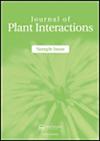Carbon assimilation and water-use efficiency in cowpea varieties inoculated with Bradyrhizobium, measured using 13C natural abundance
IF 3.3
3区 生物学
Q2 PLANT SCIENCES
引用次数: 1
Abstract
ABSTRACT Moisture stress is one of the most important constraints for crop production in arid regions. Cowpea is a vital food legume that has been cultivated in tropical and sub-tropical regions where water is scarce. Rhizobia inoculation confers resistance to water stress legumes. Two-year field experiments were conducted to assess the carbon assimilation and water use efficiencies of inoculated cowpea varieties at three sites. The treatments consist of four varieties and three levels of Bradyrhizobium inoculation arranged in a factorial randomized complete block design with four replications. The nitrogen (% N) and carbon (% C) concentrations in plant shoots were obtained directly from the mass spectrometric analysis. The results revealed considerable variation for shoot % N and % C, shoot growth, and δ13C among the varieties. Similarly, Bradyrhizobium significantly affected plant growth, % C, C and N contents, C/N ratio, and carbon isotope discrimination of the shoot. For instance, C and N contents and the C/N ratio increased by 28, 24, and 31%, respectively, due to Bradyrhizobium inoculation. In general, these results indicated that physiological performances such as carbon assimilation and water use efficiency of the crop could be, significantly improved when effective Bradyrhizobium strains and the best performing varieties are selected.用13C自然丰度测定接种缓生根瘤菌后豇豆品种的碳同化和水分利用效率
水分胁迫是干旱地区作物生产的重要制约因素之一。豇豆是一种重要的食用豆科植物,在缺水的热带和亚热带地区种植。接种根瘤菌可使豆科植物抵抗水分胁迫。在3个地点进行了为期2年的田间试验,评估了接种豇豆品种的碳同化和水分利用效率。处理包括4个品种和3个水平的缓生根瘤菌接种,按因子随机完全区组设计,4个重复。用质谱法直接测定了植物枝条中氮(% N)和碳(% C)的浓度。结果表明,不同品种间茎部% N和% C、茎部生长和δ13C变化较大。同样,缓生根瘤菌对植株生长、% C、C和N含量、C/N比值和地上部碳同位素识别均有显著影响。接种缓生根瘤菌后,碳、氮含量和碳氮比分别提高了28%、24%和31%。综上所述,选择有效的缓生根瘤菌菌种和表现最好的品种可以显著提高作物的碳同化和水分利用效率等生理性能。
本文章由计算机程序翻译,如有差异,请以英文原文为准。
求助全文
约1分钟内获得全文
求助全文
来源期刊

Journal of Plant Interactions
PLANT SCIENCES-
CiteScore
5.30
自引率
6.20%
发文量
69
审稿时长
>12 weeks
期刊介绍:
Journal of Plant Interactions aims to represent a common platform for those scientists interested in publishing and reading research articles in the field of plant interactions and will cover most plant interactions with the surrounding environment.
 求助内容:
求助内容: 应助结果提醒方式:
应助结果提醒方式:


